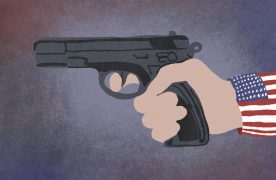
Battling the cold Boston weather, more than 100 students and community members gathered on the Common on Wednesday holding flickering candles to show their support for those affected by HIV/AIDS.
This candlelight vigil was only one of many held throughout the city for World AIDS day.
Harvard Medical School student Nworah Ayogu, one of the vigil organizers, said change lies in raising awareness and spurring people into action.
“People always hype on awareness as an end in itself, but awareness is only useful when it’s coupled with action,” he said. “A vigil is only great if it inspires us to do something.”
Patrick Lee, director of the Global Primary Care Program at the Massachusetts General Hospital and an instructor of medicine at the Harvard Medical School, agreed with Ayogu.
“For change, there are two languages, the language of love, and the language of power,” he said. “But we should think about how to transform the language of love into the language of power.”
Following the candlelight vigil at the Common, activists left to protest President Barack Obama’s lack of funding for AIDS programs at Senator John Kerry’s office in Bowdoin Square, Ayogu said.
“Until we build a political will, the politicians can’t act on it,” he said. “They need to be able to come to the table and say, look at all these events that are happening, look at all these phone calls we’re getting, this is what the people want.”
At Boston University, student groups on-campus organized two-days of lectures and activities to raise awareness.
The groups screened a documentary “The Lazarus Effect” in the Howard Thurman Center.
According to the documentary, treatment using antiretroviral drugs for HIV patients only costs 40 cents a day.
Despite the cheap cost, it is still very difficult to reach out to all those with AIDS in Africa, said Sister Sheila Flynn, who works with the Kopanang Community Trust to help those affected by HIV in South Africa.
Flynn, who is selling handmade clothing sewn by women affected by HIV in South Africa in the George Sherman Union until Friday, said there is a “huge stigma” toward HIV/AIDS in South Africa.
“We know that AIDS accentuates all the other inequalities in the world, a place where some enjoy immeasurable wealth and goodness,” said Sister Sheila Flynn, who works with the Kopanang Community Trust to help those affected by HIV in South Africa.
In Flynn’s medical center in South Africa, not a week goes by without someone dying because government restrictions and public reactions to AIDS serve as barriers to battling the disease, she said.
A candlelight vigil was also held on Marsh Plaza to remember those who died from AIDS.
“This is a chance to take a minute to be silent and be grateful that we are fortunate enough not to have AIDS,” said College of Arts and Sciences senior Cassie Nelson, a member of the planning committee for World AIDS Day at BU.
BU student groups have held a candlelight vigil for AIDS victims on World AIDS Day for more than two years, she said.
“Even though it’s just lighting a candle, it still shows support towards the brotherhood that is mankind,” said Alexander Mejia, a School of Hospitality Administration junior. “It’s part of our innate sense to care for each other.”
“It brings together everyone who has a passion and allows people who don’t normally speak up to do so,” said College of Communication junior Samantha Gordon.
On Thursday, BU will offer free rapid HIV testing on the third floor of the GSU from 1 – 4 p.m and hold a lecture in the GSU at 7 p.m.
This is an account occasionally used by the Daily Free Press editors to post archived posts from previous iterations of the site or otherwise for special circumstance publications. See authorship info on the byline at the top of the page.












